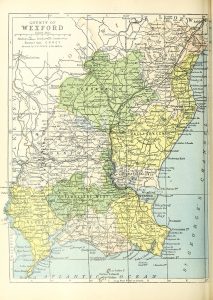‘Yola’ is an extinct form of English that was spoken in this area of County Wexford for hundreds of years. The Yola language became extinct in the 1880s but many words and phrases still survive in the locality.
‘Yola’, which means ‘old’, evolved from ‘Old English’. Old English was brought to Ireland by the Normans. When communities of Flemish, French, Welsh, English and Frisian-speaking settlers came here, following the Normans, they and the existing norse/viking and native Irish populations had a major influence on the Yola language. It became a ‘muskaun’ or ‘mix’ of all these languages.
St. Catherine’s Church would have hosted many weddings over the centuries and in honour of this, you will find below a translated extract from an old Yola song, possibly originating in the 15th or 16th century, entitled ‘The Wedding of Ballymore’:
A peepeare struck ap; wough dansth aul in a ring,
The piper struck up, we danced all in a ring,
Earch myde was a queen, an earch bye was a king,
Each maid was a queen, and each boy was a king,
Zoo wough aul veil a-danceen; earch bye gae a poage,
So we all fell a-dancing, each boy gave a kiss,
To his sweethearth, an smack lick a dab of a brough.
To his sweetheart, and a smack like a slap of a shoe.
Zoo wough kisth, au wough parthet; earch man took his laave,
So we kissed and we parted, each man took his leave,
An a boor lithel breedegroom waithed wonderfullee griefte,
And the poor little bridegroom looked wondrously grieved,
Zoo wough aul returnth hyme, contented an gaay,
So we all returned home, contented and gay,
To our pleoughes an mulk-pyles till a neeshte weddeen die.
To our ploughs and our milk-pails till the next wedding day.
This information was shared with us by Bileen Scallaan, a local linguistics student who has studied the Yola language extensively.
–
Learn more about ‘Yola’:
You can learn more about Yola from this RTÉ-produced radio documentary.
The following videos contain some more examples of spoken Yola:
This second video is in Irish with English subtitles. A documentary video about one language, produced in another, with subtitles from a third – a linguist’s dream!
…
Send us your contribution to the Norman Way by emailing thenormanway@wexfordcoco.ie

